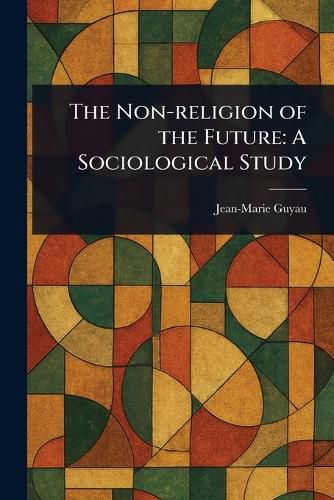Readings Newsletter
Become a Readings Member to make your shopping experience even easier.
Sign in or sign up for free!
You’re not far away from qualifying for FREE standard shipping within Australia
You’ve qualified for FREE standard shipping within Australia
The cart is loading…






This title is printed to order. This book may have been self-published. If so, we cannot guarantee the quality of the content. In the main most books will have gone through the editing process however some may not. We therefore suggest that you be aware of this before ordering this book. If in doubt check either the author or publisher’s details as we are unable to accept any returns unless they are faulty. Please contact us if you have any questions.
Jean-Marie Guyau's "Non-religion of the Future: A Sociological Study" offers a profound exploration of irreligion and its potential impact on society. A vital text in the fields of sociology and the philosophy of religion, Guyau delves into the burgeoning landscape of atheism and its relationship to social change.
This study examines the evolving role of religion, or the lack thereof, within the framework of societal structures. It invites readers to consider the potential future of belief systems and the consequences for human connection and ethical frameworks. Guyau's work remains relevant for anyone interested in understanding the sociological forces that shape our world, particularly those concerned with the continuing dialogue surrounding faith, reason, and the human condition. This meticulously prepared print edition ensures that Guyau's important contribution to social science continues to be accessible.
This work has been selected by scholars as being culturally important, and is part of the knowledge base of civilization as we know it.
This work is in the public domain in the United States of America, and possibly other nations. Within the United States, you may freely copy and distribute this work, as no entity (individual or corporate) has a copyright on the body of the work.
Scholars believe, and we concur, that this work is important enough to be preserved, reproduced, and made generally available to the public. We appreciate your support of the preservation process, and thank you for being an important part of keeping this knowledge alive and relevant.
$9.00 standard shipping within Australia
FREE standard shipping within Australia for orders over $100.00
Express & International shipping calculated at checkout
This title is printed to order. This book may have been self-published. If so, we cannot guarantee the quality of the content. In the main most books will have gone through the editing process however some may not. We therefore suggest that you be aware of this before ordering this book. If in doubt check either the author or publisher’s details as we are unable to accept any returns unless they are faulty. Please contact us if you have any questions.
Jean-Marie Guyau's "Non-religion of the Future: A Sociological Study" offers a profound exploration of irreligion and its potential impact on society. A vital text in the fields of sociology and the philosophy of religion, Guyau delves into the burgeoning landscape of atheism and its relationship to social change.
This study examines the evolving role of religion, or the lack thereof, within the framework of societal structures. It invites readers to consider the potential future of belief systems and the consequences for human connection and ethical frameworks. Guyau's work remains relevant for anyone interested in understanding the sociological forces that shape our world, particularly those concerned with the continuing dialogue surrounding faith, reason, and the human condition. This meticulously prepared print edition ensures that Guyau's important contribution to social science continues to be accessible.
This work has been selected by scholars as being culturally important, and is part of the knowledge base of civilization as we know it.
This work is in the public domain in the United States of America, and possibly other nations. Within the United States, you may freely copy and distribute this work, as no entity (individual or corporate) has a copyright on the body of the work.
Scholars believe, and we concur, that this work is important enough to be preserved, reproduced, and made generally available to the public. We appreciate your support of the preservation process, and thank you for being an important part of keeping this knowledge alive and relevant.